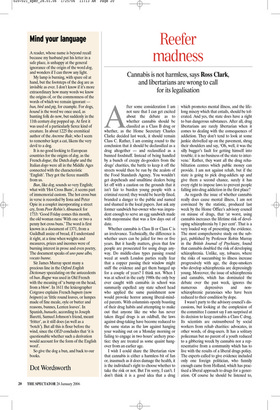Mind your language
A reader, whose name is beyond recall because my husband put his letter in a safe place, is unhappy at the general ignorance of the origin of the word dog, and wonders if I can throw any light.
My lamp is burning, with spare oil at hand, but the footsteps of the dog are as invisible as ever. I don’t know if it’s more extraordinary how many words we know the origins of, or the commonness of the words of which we remain ignorant bun, bird and pig, for example. For dogs, hound is the word we once used, as hunting folk do now, but suddenly in the 11th century dog popped up. At first it was used of a particularly fierce kind of creature. In about 1225 the eremitical author of the Ancrene Rule, who I seem to remember kept a cat, likens the very devil to a dog.
It is no good looking to European countries for the origins of dog, as the French dogue, the Dutch doghe and the Italian dogo were all in the Middle Ages connected with the characteristic ‘English’. They got the fierce mastiffs from us.
Bun, like dog, sounds so very English; what with ‘Hot Cross Buns’, it seems part of immemorial custom. The hot cross bun in verse is recorded by Iona and Peter Opie in a couplet incorporating a street cry, from Poor Robin’s Almanack for 1733: ‘Good Friday comes this month, the old woman runs/ With one or two a penny hot cross buns.’ The word is first known in a document of 1371, from a Guildhall assize of bread, if I understand it right, at a time when weights and measures, prices and incomes were of burning interest in prose and even poetry, The document speaks of uno pane albo, vocato bunne.
Sir James Murray spent many a precious line in the Oxford English Dictionary speculating on the antecedents of bun. Bugne was used in Old French with the meaning of ‘a bump on the head, from a blow’. In 1611 the lexicographer Cotgrave explains French bugnets (now beignets) as ‘little round loaves, or lumpes made of fine meale, oyle or butter and reasons, bunnes, Lenten loaves’. In Spanish, bunuelo, according to Joseph Baretti, Samuel Johnson’s friend, meant ‘fritter’, as it still does (as well as a ‘botch’). But all this is flour before the wind, since the OED concludes that ‘it is questionable whether such a derivation would account for the form of the English word’.
So give the dog a bun, and back to our books.
Dot Wordsworth






















































 Previous page
Previous page